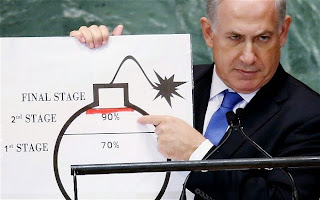Israel e o Irã já foram amigos, na luta contra os sunitas islâmicos. Mas desde a Revolução Iraniana de 1979, Israel enfrenta politicamente e militarmente tanto os países sunita, como os xiitas.
Israel tinha feito uma joint venture com uma empresa de petróleo iraniana em 1968, quando o Irã era governando por Reza Pahlavi. Uma corte da Suíça mandou ontem que Israel pagasse US$ 1,1 bilhão pelo acordo de 1968 . Mas Israel disse que não irá pagar. O que se diz é que Israel não quer financiar o inimigo, que está sob domínio de extremistas islâmicos desde 1979 e ameaçam destruir Israel diariamente.
O que você faria? Qual é o correto a fazer?
Vejam texto do Zero Hedge:
Israel is refusing to comply with an order by a Swiss court that it pay $1.1 billion that it has owed to Tehran since before Iran’s 1979 Islamic revolution for its share of a jointly owned oil pipeline.
“Without referring to the matter at hand, we’ll note that according to the Trading with the Enemy Act it is forbidden to transfer money to the enemy, including the Iranian national oil company,” the Israeli Finance Ministry said in a statement.
The complex dispute stems from 1968, when Shah Reza Pahlavi ruled Iran. The Eilat Ashkelon Pipeline Co. (EAPC) was created as a joint venture between an Israeli company, Trans-Asiatic Oil Ltd. (TAO), which is registered in Panama, and the National Iranian Oil Co. to supply Iranian oil to Europe.
At that time, the oil was taken by ship to the Israeli port of Eilat at the northern tip of the Gulf of Aqaba. From there it moved through a network of pipelines to Ashkelon on Israel’s Mediterranean coast, then to the northern Israeli port of Haifa and on to European customers.
The National Iranian Oil Co. provided 14.75 million cubic meters of crude oil through the EAPC, earning $450 million for TAO.
With relations between the two countries now severed, EAPC now is the sole operator of more than 450 miles of the EAPC pipelines in Israel, according to the company’s website.
In its ruling, the Swiss court said the Israeli company hadn’t paid its share owed to Iran before its 1979 Islamic revolution for buying and shipping that country’s oil through an Israeli port, according to Iran’s Islamic Republic News Agency (IRNA), quoting an “informed source” at Iran’s Presidential Center for Legal Affairs.
Before Iran’s revolution, it and Israel were allied against the Sunni Muslim Arab nations in the region, who bridled against both the presence of a Jewish state in the Middle East and against Iran, a country that predominantly adheres to rival Shi’a Islam.
Now Iran and Israel are sworn enemies, with Tehran providing billions of dollars in military and financial aid to groups aligned against Israel, including Hezbollah in Lebanon and Hamas in Gaza.
After the revolution, when Iran made clear its enmity to the Jewish state, Israel expropriated all Iran’s assets in its territory. That included effectively nationalizing the pipeline.
Iran responded with three international arbitration suits in both Swiss and French courts not only for what it said were billions owed for Israel’s operation of the pipeline, but also for other expropriated assets.
The IRNA report says the Swiss court’s ruling involves only Iran’s delivery of the 14.5 million cubic meters of crude as part of the old joint venture.
At first, in 1989, the court ordered TAO to pay $500 million, which included interest, to Fimarco Anstalt, a subsidiary of the National Iranian Oil Co. registered in Lichtenstein before the 1979 revolution.
That ruling was put on hold, however, because of a dispute over issues including the amount of interest owed. IRNA reports that the latest ruling brings an end to that case. According to the court, Israel's liability includes not only the $1.1 billion for its share in EAPC, but an additional $7 million to cover Iran’s legal fees.

"Devo não nego, pago quando puder".Esse é o adágio do (des)governo pulha brasileiro contra o povo, mas soa muito ao contrário no caso de Israel e Irã.
ResponderExcluirÉ isso aí Israel.